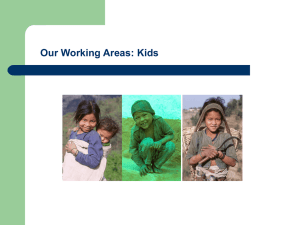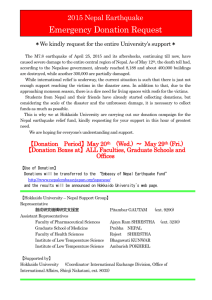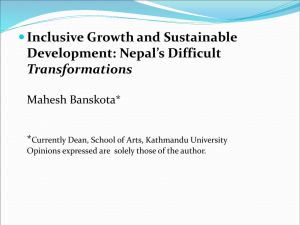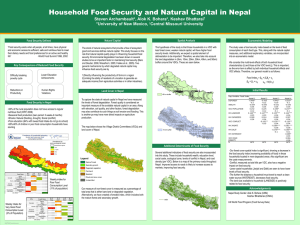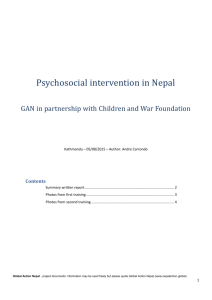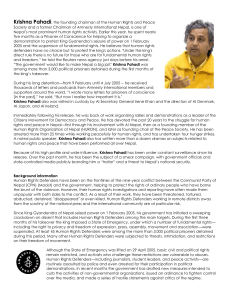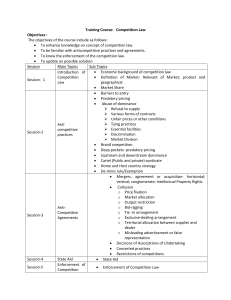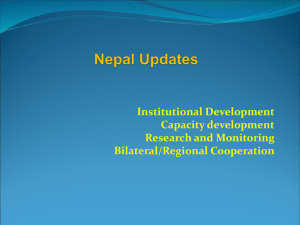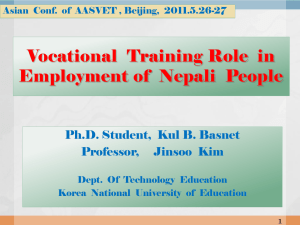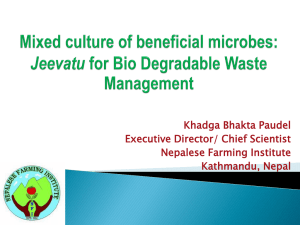London Presentation version3 (3)
advertisement
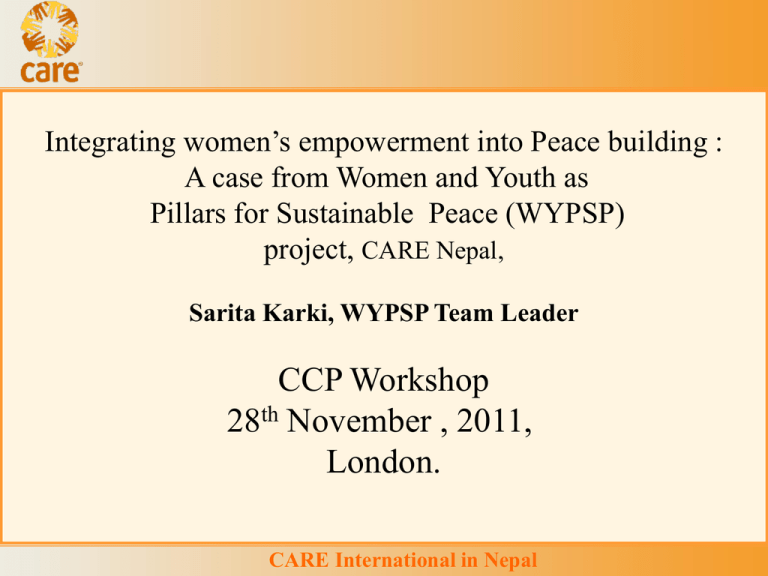
Integrating women’s empowerment into Peace building : A case from Women and Youth as Pillars for Sustainable Peace (WYPSP) project, CARE Nepal, Sarita Karki, WYPSP Team Leader CCP Workshop 28th November , 2011, London. CARE International in Nepal WYPSP TOC (20010-2011) “If peace centre is strengthened and the capacities of peace ambassadors, citizen journalists, peace pressure group and mediators are developed to enable them to raise the issues of the PVSE, then peace groups will contribute to local peace building processes”. CARE International in Nepal WYPSP intervention model for advocacy National PVSE Issues Indentified and advocated Level District Level Shanti Mallika/Na garik Awaz Like Minded Organization works with Line agency, media, MOPR & other line Ministries, women commission District Level Peace Centre, expanded linkage with district Pressure groups (Bridged by P.A policy Feed Back) Community Level VDC Level Peace Pressure Group. P.A,C.J , Mediator, Psychosocial, Support group Peace Groups (6 each at ward level) Women men share in Peace group Why Women are involved in this Project • • • • • Conflict affected women population - low literacy rate, heavy workload, their right to information not ensured and self esteem very low Women right awareness enables them towards collective social action (local resources, increase representation, increase in women's mediation role ) Women irrespective class from different caste groups come together for common issues Conflict management skill transformation to women peace group members complements to minimize local disputes, (mediation support) Women’s involvement will increase community trust and recognition as peace actors CARE International in Nepal How does WYPSP Empower Women? • Weekly discussion sessions at peace groups empowers women agency, • Women's learning attitude and willingness • Promotion of local peace support mechanism increases women's representation in decision making at local level to seek women’s meaningful participation • Gaining trust and recognition of women as peace actors at all level by building their capacity to negotiate. Mediate, transforming skill increasing knowledge. CARE International in Nepal Lessons learned from WYPSP project on Gender to PB. • Peace building intervention needs to assess women’s ability and need at all level including class, and caste because their suffering differs • Women’s understanding of peace building and security needs to be assessed, they are more involved in economic activities, household. • Effective policy implementation by state and its monitoring by civil society organization (UNSCR 1325 National Action Plan(NAP) implementation) • Inter group, cross district exposure visit complements to empowering women CARE International in Nepal Lessons learned from WYPSP project on Gender to PB. • Capacity building of Poor Vulnerable Socially Excluded(PVSE) women as citizen journalists and peace ambassadors enables them raise issues locally and expand linkages with other organizations for resource leverages. • PVSE believe that Peace without social justice is incomplete. Peace Building is not confined only to right attainment, moreover building harmony and greater level of satisfaction of all the member of the community. • Women issues differs according to socio cultural context, and their experience of conflict, • Peace support mechanism serves as safety net for women to advocate for their rights. CARE International in Nepal Lessons learned from WYPSP project on Gender to PB.Contd. • Close coordination is essential to promote organic linkage at all levels, it is more effective with like minded organization. • Changing ideology, beliefs and pattern of thinking of a person towards women is a gradual process not possible at a time. • Women groups interaction with policy makers and service providers motivates women for collective action • Peace support mechanism creates space to promote micro macro linkage for advocacy for women to attain and enjoy their rights CARE International in Nepal What lessons learned linking advocacy at multiple levels to PB? • Weekly sessions enables women to prioritize issues and address issues at local level and aware them about national and international instruments for women peace and security. • Intervention model of women as Citizen Journalist, mediators and Peace Ambassadors helps to raise issue and advocate at various levels • Linkage between community, district and national initiatives creates greater pressure at various level for peace process. • Different actors involve in this program have their own agendas, therefore, sometime issue prioritization for peace building and linking at higher level becomes a challenge CARE International in Nepal Risk towards mobilizing Women as peace builders • Women trust towards service providers to seek state security services, • Socio cultural acceptance of women as PB • Social recognition as peace actor, they are seen as sufferers only. • Political protection/criminals • Power pressure from elites and security threat CARE International in Nepal How Theory Of change has complemented to empower women? • Awareness classes and empowering agency • Increased representation to influence decision making process and increases access to attain and enjoy rights • Social recognition as peace actor, relationship strengthened at all level. CARE International in Nepal Thank you CARE International in Nepal


